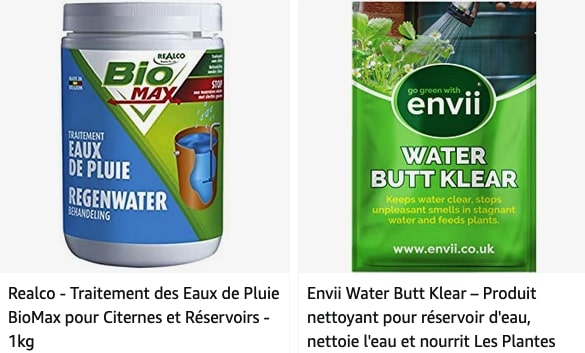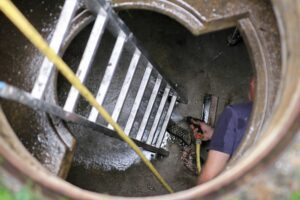At some point, you may notice that the water in your cistern is starting to foam and give off an unpleasant putrid smell. Here is a solution to prevent your cistern or rainwater tank from smelling or smelling bad.
Why can a cistern smell?
 Cistern water starts to smell when bacteria break down dirt, grime, dust, leaves, pollen and bird droppings. These organic materials find their way into the rainwater cistern via the rainwater. It is therefore essential to install high quality filtration systems at the cistern inlet.
Cistern water starts to smell when bacteria break down dirt, grime, dust, leaves, pollen and bird droppings. These organic materials find their way into the rainwater cistern via the rainwater. It is therefore essential to install high quality filtration systems at the cistern inlet.
If the rainwater smells bad, it can be caused by:
- Sludge: rainwater always contains small particles of dirt and sand. These particles fall to the bottom of the cistern where they form a layer of sludge. Dead leaves that have fallen to the ground also end up there. In the long term, this layer of mud must be removed when the cistern is maintained, otherwise the water will become too polluted.
- Dry siphon: During long periods without rainfall, a dry siphon can be the cause of dirty (smelly) rainwater. Be sure to fill the rainwater storage to keep the siphon wet.
- Too much storage capacity: If you have too much storage capacity for the amount of rainwater you collect, the water can also become dirty. There is then too little cooling of the rainwater.
- Moss: Moss can be washed off the roof with the rainwater and end up in the cistern, polluting the rainwater.
- Algae: In principle, micro-organisms ensure that algae do not grow in rainwater. However, algae growth is still possible, which also leads to pollution.
Roofs: Roofs can also contaminate the cistern. Small pieces of the top layer of roofing, such as roofing or shingles, are washed off by rainwater, resulting in pollution.
What to do if the rainwater stinks?
Try to identify what is causing the smell to appear.
If you can’t, it may be worthwhile to test the water in the cistern. If the water in your cistern continues to deteriorate, you should conduct a water test:
- using test strips
- by sending a sample of your water to a laboratory that can microbiologically analyze the cistern water and find out why the water smells bad.
If you use your cistern water for domestic purposes, you should have your rainwater tested regularly for pollutants and bacteria. Even if you only use it for flushing the toilet or doing laundry.
Remedies for the most common causes of bad odours
- A dry trap or clogged filters. During a long dry spell, you can fill the trap with water at the well overflow.
- Faulty post-filter: clean the filter or replace the filter cartridges.
- The silt layer at the bottom of the well may also have a bad smell, or there may be algae in your well. In this case, the radical solution is to empty all the rainwater from the cistern and clean it thoroughly to remove the organic matter. Before you get to that point, you can also try organic rainwater treatments. These are simple, 100% biological solutions that break down organic pollution in the cistern. This improves water quality and quickly reduces odors and algae.

Should a cistern be cleaned when it smells bad?
Yes, if the water in a cistern smells bad, it must be cleaned.
 But a cistern also requires regular maintenance, and not only in case of bad odours.
But a cistern also requires regular maintenance, and not only in case of bad odours.
Sometimes, it is also necessary to empty the tank to inspect it. The larger the capacity of a cistern, the more rainwater you can collect for your personal use. But sometimes the collected water is simply stored too long and remains untouched. If the water stays in the cistern for a long time, its oxygen content decreases. The lower the oxygen content, the more comfortable the anaerobic bacteria that break down the organic matter in the cistern.
Water has been sitting in your tank too long, for example, due to overcapacity. Use a tank aerator for water that has been standing for a long time. The Oase AquaOxy Pond Aerator is equipped with a timer so that it is only active for a few hours a day (or at night to avoid disturbances due to the noise generated). The pond aerator should never be used all day long: Especially in summer, the circulation of rainwater leads to a heat input. This can lead to an increase in the temperature of the water in the cistern.
How to prevent a cistern from smelling bad?
Here are some preventative measures to keep your cistern water clean and clear
Shading of aboveground cisterns and rainwater tanks
If you have an aboveground cistern that is exposed to the sun, you should shade or cover it. This is because anaerobic bacteria thrive in warm rainwater and rotting is encouraged. To shade your cistern, you can install a shade sail* or cover it with a white UV-resistant tarp*.
Covering the tank to fight against organic pollution
If your cistern is not covered or if it is damaged, there is a risk that large dirt particles will enter the rainwater tank.
The consequence is that the water starts to smell bad after a while. That is why rainwater tanks should always be equipped with a cover or a protective hood to prevent external substances from entering the tank.
The same applies to rainwater barrels and drums. Organic matter that gets into them undergoes anaerobic decomposition and the water starts to smell.
Installing a Cistern Filter
A cistern should not be used without a filtering device to remove impurities. Only a filtering device can collect large waste products.
Both downspout filters and tank filters should be used.
- Downspout filters are the first level of filtration, capturing large particles from the roof that are washed away by a rainfall.
The cistern filter is the second level of filtration, which retains fine organic particles.
These filters are therefore placed upstream of the water inlet in the cistern. They can save a lot of work, time and money and should therefore be installed as a matter of course.
Conclusion
Now you know how to solve the problem if your cistern smells bad. You also have tips on how to prevent bad odours from appearing in your rainwater.